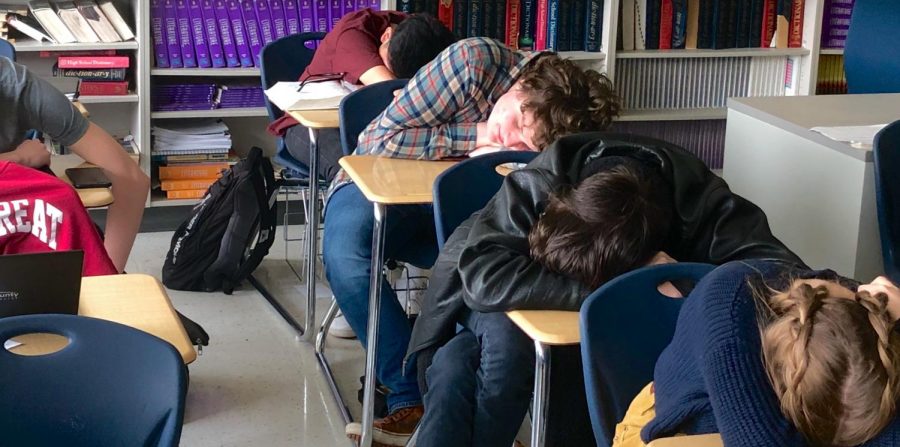Chamblee’s Walking Dead: Sleep Deprivation Epidemic Escalates
Photo courtesy of Iris Tsouris.
Chamblee students succumb to a deep slumber.
February 25, 2020
To survive, humans must meet five basic (but essential) needs: food, water, air, shelter, and sleep. Yet sleep deprivation, or the lack of sufficient sleep, remains a leading concern among schools across the nation, including Chamblee. Students are not getting enough sleep, and it detrimentally affects not just their performance in school but also their physical and mental health now and in the future.
According to the American Academy of Sleep Medicine, sleep deprivation primarily leads to excessive daytime sleepiness, which is especially hazardous to students who drive to school, and can also cause anxiety, a lack of motivation and concentration, distractibility, fatigue and increased errors, among other effects. The CDC also states that sleep deprivation has been linked to chronic diseases and conditions such as type two diabetes, heart disease, obesity and depression.
The National Sleep Foundation reports that 13–17-year-olds require eight to ten hours of sleep per night, yet a study from the same source shows that teens only get about 6.8 hours per night on average. These results seem to be reflected in Chamblee’s student body as well.
The Prevalence of Sleep Deprivation at Chamblee
“I would say over 75% of the kids here at least suffer from some sort of sleep deprivation,” said English teacher Jennifer Andriano. “I definitely see some kind of sleeping in the class, but it’s less of what I see and more of what I hear—you know, [things like] ‘I was up until four o’clock this morning,’ or ‘I went to bed at one but had to get back up at five so I could finish my work.’”
One reason why students are unable to get enough sleep at night is that they must manage and distribute their time between their schoolwork, extracurriculars and out-of-school activities.
“It’s mostly just ‘cause of balancing different stuff—like I’m part of the YMCA leaders group and then extracurriculars like swimming and everything like that—balancing that with homework, you’re not always gonna get the amount of sleep that you necessarily need for the day,” said junior Chris Smith.
This appears to be a common trend among students, as they find that there is not enough time in the day after school to balance a heavy schedule with the amount of recommended sleep for teens.
“If I just sleep as much as I feel that I should, with sports and whatnot, I usually get around eight to nine hours. But with school, a lot of times I’m only able to get six to seven,” said senior Andrew Rodgers.
Sometimes, students’ struggles with balancing sleep and school work dig them deeper into a cycle of sleep deprivation that gradually gets harder to get out of.
“It’s really made it hard because sometimes I have to sacrifice sleep to get the stuff I want to do done,” said sophomore Jamie King, “[And] it’s weird because it’s like the more work I do, the less sleep I get and the less sleep I get, the less work I’m able to do.”
Causes and Effects of Sleep Deprivation
Some students feel that teachers may sometimes assign too much work, which can be especially hard to manage if the student is already taking on a number of high-workload classes.
“I see a lot of kids just sleeping in class, like sometimes you just can’t help that because of how much work [the teachers] give you,” said Smith. “I know a lot of people say they get like three hours of sleep a night, especially with the extensive classes that they take and how much work they have [because] with different APs you are signing up for college-level work.”
On the other hand, world history and economics teacher Carolyn Fraser believes that technology, rather than schoolwork, is the real culprit to blame for why students don’t get enough sleep at night.
“Technology plays a huge role,” she said. “Kids are staying up for social media and gaming and all this other kind of stuff. So because there’s more options for their free time, they’re losing sleep over it because [sleep] is the easiest thing to give up.”
All students are affected differently by a lack of sleep. Some sleep-deprived students will rarely experience excessive daytime sleepiness but do experience the mood and performance effects, such as irritability or attention deficits, whereas others may be prone to knocking out at any time when deprived of sleep but feel fine otherwise.
“I don’t really fall asleep in class but [in] periods one through three or one through four, I’m just like a walking zombie basically; I’m just trying to push through and it usually goes by in a blur because I’m tired,” said Smith.
The effects can even go past the classroom and on the field, court or track, where it affects students’ performance in sports.
“I don’t really think it affects my performance in school that much, ” said Rodgers. “I see it more athletically and just being tired at the end of the day and kind of needing a pick-me-up.”
Teacher Responses and Possible Solutions
So how are teachers responding to this apparent sleep epidemic?
Some teachers are beginning to reduce the amount of homework they give out, which seems to be the biggest complaint among students.
“Honestly, I’m kind of anti-homework and that’s just a personal preference. Especially for English—besides a little reading or something—I feel like everything can be done in the classroom,” said Andriano. “I feel like homework should only be used for specific purposes and it doesn’t need to be excessive. If [teachers] are taking two hours for one subject, that’s too long; it’s not having respect for all of your colleagues and all of the other classes that your students have.”
Andriano believes that homework should not take priority in students’ lives outside of school when it causes them to sacrifice time from other important things like sleep.
“I don’t think a kid’s entire day should be taken up with schoolwork,” she said. “I feel like sleep and exercise and things like that definitely are really important for students to get, and they’re not getting enough.”
Smith suggested that teachers should coordinate with each other as well as communicate with students to determine when to assign work so that it works in favor of the students’ best interests.
“I think teachers should probably coordinate how much homework they assign on which days and everything because if it’s spread out more instead of piling on one day, then it’s easier [for the student],” he said. “[They should] talk to their students about what works for them. Some teachers can’t help it because that’s their curriculum, and they have to assign that amount of work, but the way that they assign it [should be] communicated with the students on how it will benefit them and what is too much and too little; just negotiate with them.”
Likewise to Andriano, Fraser gives her students minimal homework assignments and has them get most of their work done in class so that they have time for other things outside of class.
“I don’t know what I can do. I don’t give them much homework so, you know, it’s not my homework that’s keeping them up late,” she said. “I don’t really do much home assignments. My AP World [class], they’re doing reading, but I’m spreading it over a number of days and I give them reading guidelines [and] my seniors don’t have much homework at all, we do everything almost entirely in class.”
She believes that parents are partly responsible for making sure that their child stays focused on their work and are not distracted by technology so that they have enough time for an adequate amount of sleep.
“I think it’s discipline in the home. Parents aren’t necessarily wanting to police technology for their kids and so therefore they take the path of least resistance. One of the challenges of parenting young adults is [determining] how do you help them develop good work and sleep in a routine, [and] it’s hard,” said Fraser.
Looking Forward
Regardless of the reason, sleep deprivation continues to be a prevalent issue at Chamblee, with some believing that its effects are too severe to simply ignore.
“I think some of the time [losing sleep] is one of those things that you can kind of get through for a short period of time, but if it’s something that you’re doing every day for a semester or more, it can become a more serious issue,” said Rodgers.
The question now remains whether or not sleep deprivation is an issue outside of the school’s control and, if not, what measures Chamblee can take to address the problem.











